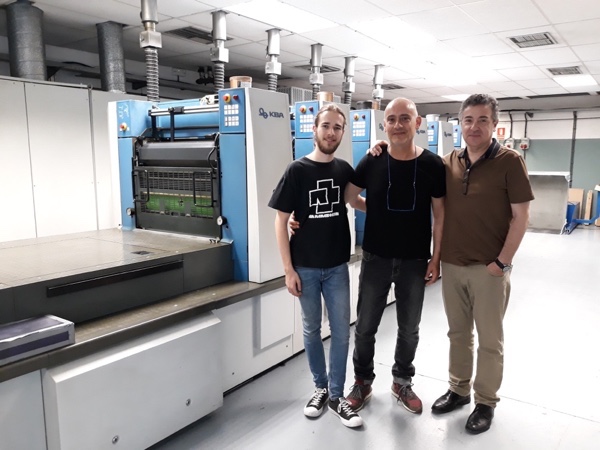Consumables
Rohan Cards choses Toray

Tuesday 14. August 2018 - Toray Graphics in the Czech Republic, a leading manufacturer of waterless offset plate technology, today reported that Barcelona-based Roldan Card has been using waterless offset printing for the past 15 years to achieve the level of quality and cost efficiency of its loyalty card and other customers demand.
The company was founded 25 years ago and employs 25 people in a 1.5-shift operation with KBA Rapida74 and KBA 74Karat waterless offset presses. The company uses Toray IMPRIMA MC plates designed to print on plastics, producing an average run length of 1,000 units and between four and eight projects per day depending on complexity. In addition to loyalty cards, Roldan produces a wide range of other plastic cards, including access cards for football teams from Spain and other European countries.
“When we started with waterless offset printing 15 years ago, there was only one other company in Spain using the process,” said Mr. Albert Roldan, CEO of Roldan Card. “We chose waterless offset printing primarily for the quality it delivers when printing on plastic as compared to traditional water-based offset, including fast drying times with UV curing. This is important since printing is only about 20% of the process, and the faster we can move to laminating and cutting the cards, the more work we can deliver.
“An added benefit is the reduced makeready time and printing stability throughout the run. Our materials are expensive, and waterless offset with Toray IMPRIMA plates saves us 20% in material waste. Since we use about 300 tons of plastic material per year, this really adds up.” Roldan points out that even though the plates and ink cost more than conventional offset consumables, the savings in material waste more than makes up for that cost difference. “Using a water-based process to print on plastics is problematic,” he adds. “And the Toray IMPRIMA MC plate is chemistry free, which adds to its stability. Our plate professionals know if they get the plate imaging right, they wont have any issues with the developer. With a chemistry-based process, the effect on the plate can be different each time. That lack of stability creates waste, reduced quality and slows down the entire production process.”
Roldan also emphasizes the importance to the company and its customers of the environmental benefits of waterless offset printing with Toray plates, stating, “We also chose waterless printing for environmental sustainability reasons. Waterless offset printing does not use water or isopropyl alcohol and has no emission of volatile organic compounds (VOCs) into the atmosphere.”
Toray waterless plates are negative working, non-ablative, thermal plates that utilize traditional printing presses equipped with ink temperature control systems to effectively print on paper, plastics and other substrates without dampening solutions. Plates within the IMPRIMA family are designed to meet specific application needs. This includes IMPRIMA SB, SC and SD for high definition and security printing, IMPRIMA LB for high resolution label printing, IMPRIMA WA and WB for coldset and heatset web offset applications, and IMPRIMA MC for plastics.
“While we have had to be creative in developing our waterless offset processes as one of only two waterless offset shops in Spain, we have received excellent support from Toray,” Roldan added. “And we are thrilled about the opening of the new R&D center in the Czech Republic, as well as the array of seminars Toray plans to conduct. This will provide an additional level of support in the future along with more opportunities to network with other waterless printers.”
“Innovative companies like Roldan Card are exciting partners for us,” said Bára Krupickova, Marketing and Sales of Toray. “They push us to continue to improve the quality, functionality and flexibility of our products, and the results benefit our entire installed base. Roldan Card is an exceptional example of a company leveraging the benefits of waterless offset printing for success and continued growth.”
